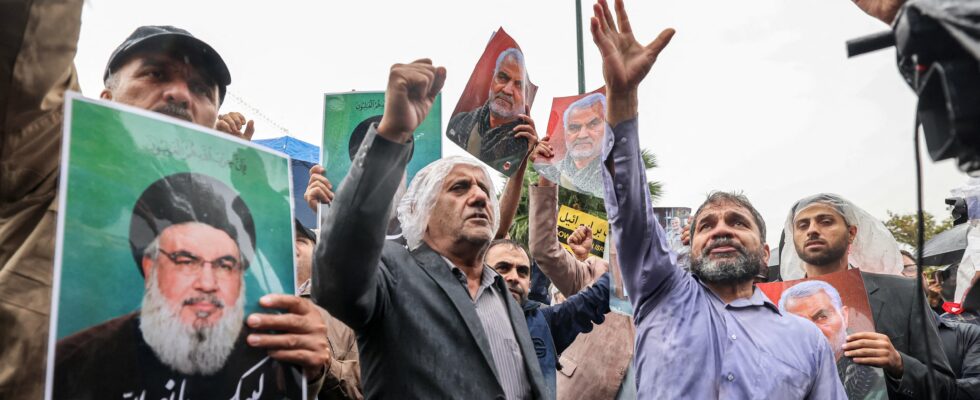The Middle East is plunging into the unknown. Israel killed Hezbollah leader Hassan Nasrallah in a strike near Beirut on Friday, Hezbollah confirmed on Saturday September 28. A diplomatic failure for the United States, according to the foreign press, which wonders about an escalation in the event of an Iranian reaction.
If the assassination of Hassan Nasrallah is “a measure of justice”, according to American President Joe Biden, the latter nevertheless continues to ask for a “ceasefire” in Lebanon. The United States and several of its allies had already submitted a request for a temporary 21-day ceasefire this week, which was rejected by Israel. To this first diplomatic hiccup was added a strike on Friday whose consequences are particularly feared. “Israeli officials did not warn their American counterparts of Friday’s strike, who were already unhappy that Netanyahu had brushed aside a 21-day ceasefire proposal made by the United States and France,” thus relates the New York Times. “Today, U.S. officials fear they are facing a broader war that could engulf the region, after nearly a year of efforts by Joe Biden to avoid such an escalation.”
“For Washington, this is a diplomatic humiliation and a demonstration of its incapacity, or refusal, to control its troublesome ally,” writes the British daily The Guardian. “In a way, it is the culmination of nearly 12 months of an American strategy which is now in ruins,” continues the newspaper, which notes that Netanyahu has systematically ignored Washington since the start of the war.
“For now, unless Iran proves itself more decisive than it has been so far, it is Netanyahu, the great survivor, who is in charge.” A point of view shared by NBC Newsaccording to whom the strike once again shows that it is “Netanyahu and not Biden who decides the agenda in the Middle East”.
“The threshold of total war has been crossed”
The future of the region is therefore particularly uncertain, points out the foreign press, which wonders about the reaction that Tehran will have. “The death of Hassan Nasrallah is an earthquake for the Middle East, increasing the risk of a conflict between Israel and Iran that would be devastating for civilians and cause tremors well beyond the region,” s worries Tom Fletcher, a former British ambassador to Lebanon in THE Financial Times.
Firas Maskad, a Lebanon expert interviewed by Middle East Eyeeven believes that “the unprecedented nature of the attack, its scale and its scope, answer the question that many of us have been waiting for, namely that the threshold of all-out war has been crossed.” THE Guardian wants to be more measured. According to the British newspaper, Iran is now forced to make a choice that it “has always sought to avoid and that its new reformist leaders, in particular, have been unwilling to make.” : settle for a condemnation, at the risk of losing credibility, “accept a ceasefire which would not also lead to a ceasefire in Gaza, the declared objective of Hezbollah”, or “launch direct military reprisals against Israel.
“All scenarios are now on the table”
In a statement Saturday, Iran’s Supreme Leader Ayatollah Ali Khamenei called on Muslims to “support the Lebanese people and proud Hezbollah with all means at their disposal and help them face the […] bad diet [d’Israël]”. For The Orient The day“all scenarios are now on the table”: “Can the Iranian regime, obsessed with its survival, jeopardize it to avoid a humiliating defeat for Hezbollah? Supreme Leader Ali Khamenei’s press release on Saturday, affirming that Israel will not be able to overcome Hezbollah, can be interpreted in different ways as a virtual abandonment, or as a way of gaining time before preparing the response.”
For Ali Rizk, political and security analyst, interviewed by Al Jazeera on Saturday“Iran is unlikely to opt for full escalation”, but will likely continue to “fight through proxies, including allies in Iraq and Yemen” rather than engaging in direct confrontation with Israel.
The pro-regime Iranian newspaper Iran Daily For his part, he believes that Nasrallah’s assassination “should not deal a fatal blow to Hezbollah”, even if it “left a void within the group’s leadership. […] As Hezbollah begins the process of selecting a new leader, it will face a crucial decision: which way forward. Whatever his choice, the consequences will reverberate across Lebanon and the entire region.”
